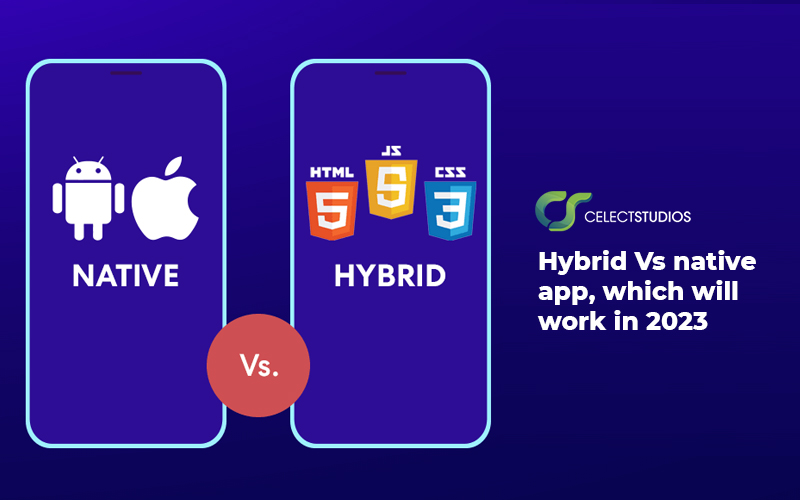As we move further into the digital age, mobile app development is becoming an increasingly important aspect of business growth. As a business owner or a mobile app developer, it’s essential to choose the right type of mobile app for your business. The two most common types of mobile apps are hybrid and native apps. In this blog post, we’ll explore the differences between the two and which one will work best in 2023.
Introduction (Web Vs Hybrid Vs Native Apps)
The mobile app industry has snowballed over the past few years. With the increasing demand for mobile apps, mobile app development companies are facing the dilemma of choosing between web vs hybrid vs native apps. All have their advantages and disadvantages, and the decision on which to choose depends on various factors such as development time, cost, performance, and user experience.
What is Hybrid App
Hybrid apps are a combination of native and web apps. These apps are built using web technologies such as HTML, CSS, and JavaScript and are then wrapped in a native app shell. This allows them to be distributed through app stores like Google Play and the App Store.
The biggest advantage of hybrid apps is that they can be developed faster and at a lower cost than native apps. This is because the same code can be used for multiple platforms, which saves time and money. Hybrid apps also have access to devise features like the camera, GPS, and contacts list, which allows them to provide a more native-like experience. However, there are also some disadvantages to hybrid apps. They can be slower than native apps, which can lead to a poor user experience. They can also be less reliable than native apps, as they rely on web technologies that can be affected by changes in the operating system or device. Some of the pros and cons of hybrid apps are given below.
Pros of Hybrid Apps
Cost-effective
These are cost-effective as they do not require separate development for different platforms.
Easy to maintain
Hybrid apps are easy to maintain as updates can be made on a single codebase, which is then reflected across all platforms.
Faster development
These apps are faster to develop as the codebase is shared across all platforms, and there is no need for separate development for each platform.
Cons of Hybrid Apps
Performance issues
When we talk about web vs hybrid vs native apps, Hybrid apps may suffer from performance issues due to their reliance on web technologies. This can lead to slow app loading times, lagging animations, and other performance issues that can negatively affect the user experience.
Limited functionality
Hybrid apps may have limited functionality compared to web apps vs native apps. They may not be able to access certain native features and APIs that are only available on specific platforms.
Complicated integrations
If we compare web vs hybrid vs native apps, Hybrid apps may require complicated integrations with native features and APIs, which can be time-consuming and costly.
Native Apps
Native apps, on the other hand, are built specifically for one platform, such as iOS or Android. They are developed using platform-specific programming languages like Swift for iOS and Java for Android. This allows them to take full advantage of the device’s hardware and software, providing a faster and more reliable user experience.
As compared to web vs hybrid vs native apps, the biggest disadvantage of native apps is that they are more expensive and time-consuming to develop than hybrid apps. This is because separate codebases need to be developed for each platform, which requires more time and resources. However, native apps can provide a more polished and higher-quality user experience, which can be critical for some businesses.
Pros of Native Apps
Superior performance
Native apps offer superior performance compared to hybrid apps. Since they are developed specifically for a particular platform, they can take advantage of the platform’s native features and APIs, resulting in faster load times, smoother animations, and better user experience.
Access to native APIs
Native apps can access the platform’s native APIs, which provides more functionality and better integration with the platform’s features. This enables developers to create more complex and feature-rich apps.
Better user experience
Native apps offer a better user experience than hybrid apps due to their ability to take advantage of the platform’s native features and APIs. This results in a more intuitive and responsive user interface that feels natural to the platform.
Cons of Native Apps
Development time and cost
If we compare web vs hybrid vs native apps, Native apps require separate development for each platform, which can be time-consuming and costly. Mobile app development companies may need to hire respective development teams for each forum, resulting in increased development costs.
Maintenance
Since native apps require separate development for each platform, maintenance can be more complicated and time-consuming than hybrid apps. Updates may need to be made separately for each platform, resulting in longer update cycles and increased maintenance costs.
Platform-specific compatibility
Native apps are developed specifically for a particular platform, which means they are not compatible with other platforms. This can limit the audience reach of the app.
Which Will Work Best in 2023?
So, which type of app will work best in 2023? The answer depends on a few factors, including your business needs, your target audience, and your budget.
If your business needs a simple app that can be developed quickly and at a lower cost, a hybrid app may be the way to go. Hybrid apps are also a good option if you need to develop an app for multiple platforms or if you want to get your app to market quickly. However, if you need a high-quality app that provides the best possible user experience, a native app is likely the better option. Native apps can also provide better security and performance, which is important for some businesses. Ultimately, the choice between hybrid and native apps vs web apps comes down to your business needs and budget. If you have the resources to invest in a high-quality native app, it’s likely the better option. However, if you need to develop an app quickly and at a lower cost, a hybrid app may be the way to go.
The choice between hybrid and native apps depends on various factors such as development time, cost, performance, and user experience. In 2023, we expect the mobile app industry to continue to grow, with more businesses adopting mobile apps to reach their target audience. Considering the pros and cons of both hybrid and native apps, we believe that the trend will shift towards native apps in 2023. According to recent research, around 4 million native apps are currently available on both Google PlayStore and App Store. While hybrid apps are cost-effective and easier to maintain, they may not be able to provide the same level of performance and user experience as native apps. With the increasing demand for high-performance and feature-rich apps, native app development will become more popular among businesses.
Furthermore, advancements in technology, such as 5G networks and more powerful mobile devices, will enable native apps to provide even better performance and user experience. This will further fuel the adoption of native apps among businesses and users.
Mobile App Development Companies
If you’re looking to develop a mobile app for your business, it’s important to choose the right mobile app development company that provides efficient native or hybrid app development services. Look for a company that has experience in developing apps in your industry and has a proven track record of success.
You should also consider the company’s pricing structure and development process. Make sure you understand how the company works and how they will communicate with you throughout the development process.
Conclusion
In conclusion, web vs hybrid vs native apps have their advantages and disadvantages. The choice between the two comes down to your business needs and budget. If you need a high-quality app with the best possible user experience, a native app is likely the better option. However, if you need to develop an app quickly and at a lower cost, a hybrid app may be a good option. Regardless of which type of app you choose, it’s important to choose a reputable mobile app development that is, Celect Studios, a company that can help you bring your vision to life.
We are the right app development partner that can help you create a mobile app that meets your business needs and provides a seamless user experience for your customers. Keep in mind that mobile app development is an ongoing process, and it’s important to stay up-to-date with the latest trends and technologies to ensure your app remains relevant and effective in 2023 and beyond.



